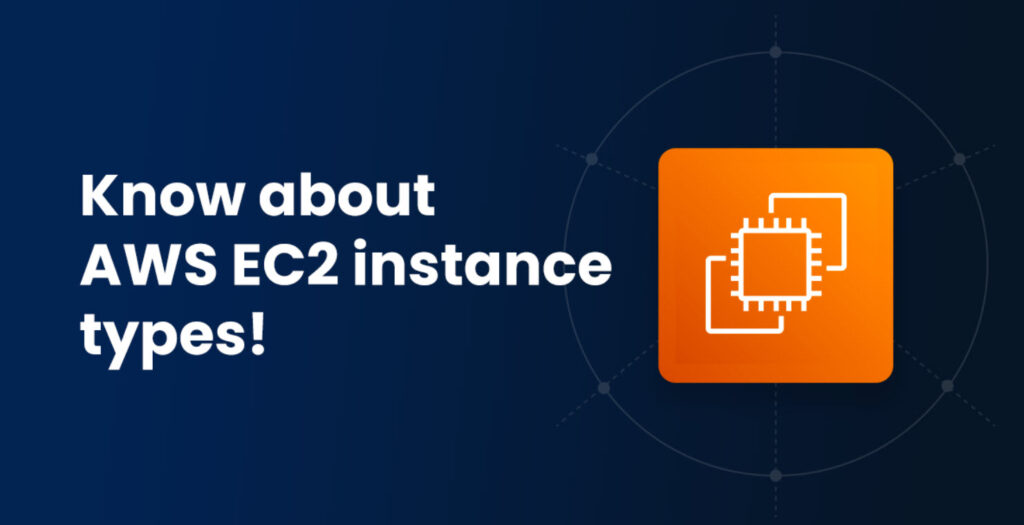
The AWS EC2 or Amazon Elastic Compute Cloud, is an on-demand cloud computing platform offered by Amazon Web Services. It is one of the most widely used cloud computing services that allow users to quickly and easily spin up virtual machines (instances) to use in their applications. Let’s discuss AWS EC2 instance types and their advantages.
AWS EC2 Instance: Definition
AWS EC2 or Amazon Elastic Compute Cloud is a web-based service that allows users to quickly and easily spin up virtual machines. These virtual machines, or “instances”, can be used for a variety of purposes, such as web hosting, application hosting, development, and testing. EC2 allows users to customize the number of computing resources they need for their applications, such as CPU, memory, storage, and networking.
AWS EC2 instances are virtual servers that are created using the Amazon EC2 service. Each instance is a virtual environment that contains the necessary resources for running an application, such as CPU, memory, storage, and networking. When an EC2 instance is launched, it is assigned an IP address, a public DNS name, and a hostname. It is also assigned a unique identifier, such as an Amazon Machine Image (AMI) ID.
- EC2 instances can be created and managed through the AWS Management Console or AWS CLI.
- EC2 instances are charged based on the type, number, and duration of instances used.
- EC2 instances can be easily resized, terminated, or stopped and started at any time, making it possible to adapt to changing computing requirements.
The AWS EC2 service allows users to select the type of instance they need based on the application requirements. Instance types vary regarding the amount of CPU, memory, storage, and networking resources they provide. The most common instance types are Amazon EC2 Instances, Amazon EC2 Spot Instances, and Amazon EC2 Dedicated Instances.
AWS EC2 Instance: Types
Amazon EC2 Instances are the most commonly used type of instance. They are designed to provide the necessary computing resources for an application. They are available in a variety of sizes and configurations, depending on the application requirements. Some of the most popular Amazon EC2 instance types include general purpose, compute-optimized, memory-optimized, storage-optimized, GPU-based, and accelerated computing.
- Amazon EC2 Spot Instances are another type of instance. They are designed to provide computing resources at a lower cost, with the caveat that the instance may be terminated at any time. This type of instance is ideal for applications that can tolerate interruptions.
- Amazon EC2 Dedicated Instances are a third type of instance. They are designed to provide dedicated computing resources for an application. They are ideal for applications that require more control over the underlying infrastructure and are more sensitive to performance.
Types of AWS EC2 Instance Types:
- General Purpose: These instances are ideal for general-purpose applications and provide a balance of computing, memory, and I/O resources. Examples: t2, m5.
- Compute Optimized: These instances are designed for compute-intensive workloads such as scientific simulations, big data processing, or video encoding. Examples: c5, c5d.
- Memory Optimized: These instances are designed for applications that require high memory and low latency, such as in-memory databases, distributed caching, and real-time analytics. Examples: r5, r5d.
- Storage Optimized: These instances are designed for applications that require high I/O performance, such as NoSQL databases, big data processing, and data warehousing. Examples: d2, h1.
- GPU Instances: These instances are designed for applications that require GPU processing, such as machine learning, video encoding, and scientific simulations. Examples: p3, g4.
AWS EC2 Instance: Advantages
AWS EC2 provides users with a number of advantages, including flexible scaling, pay-as-you-go pricing, and high availability. With EC2, users can quickly and easily spin up new instances when their application needs more computing resources or spin down existing instances when their application does not need as many resources. Additionally, users can control their costs by paying only for their computing resources. Lastly, EC2 instances are highly available and can be configured to automatically failover to other instances in the event of an outage.
- Scalability: EC2 instances can be easily resized or terminated based on the changing computational needs of the application.
- Cost-Effective: EC2 instances are charged on an hourly basis, allowing customers to pay only for the resources they use.
- Reliability: EC2 instances are hosted on the AWS Cloud, which provides high availability, reliability, and security.
- Customizable: EC2 instances can be customized to meet specific computational, memory, and storage needs.
In conclusion, AWS EC2 is a powerful and popular cloud computing service that provides users with the ability to quickly and easily spin up virtual machines. The AWS EC2 or Amazon Elastic Compute Cloud, is an on-demand cloud computing platform offered by Amazon Web Services. It is one of the most widely used cloud computing services that allow users to quickly and easily spin up virtual machines (instances) to use in their applications. AWS EC2 instance types, users can select the type of instance they need based on the application requirements and benefit from the flexible scaling, pay-as-you-go pricing, and high availability that EC2 provides.
You may also like:- Top Key Features of Snaptik You Need To Know
- The Importance Of Having Proper Hearing Aids
- Impact of Energy Efficiency on Solar Power Systems Calculations
- Maxim Krippa bought the first gold medal of the CS: GO team
- Why Your Business Needs Immutable Storage: An Explanation
- Comparing NFS and iSCSI: Key Differences Explained
- Search the Best Apparel Suppliers for Wholesale Clothes Suppliers
- Salon Equipment Spotlight: Hydrafacial Machines
- From Concept to Reality: Steps for Successfully Launching Your Restaurant
- Maximizing Efficiency with Proxies for Google Scraping








